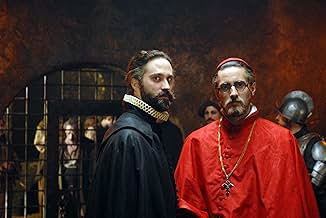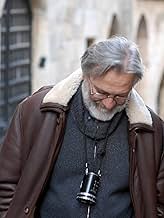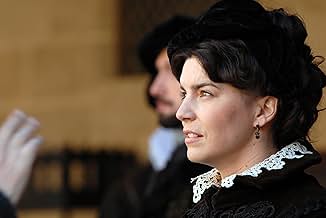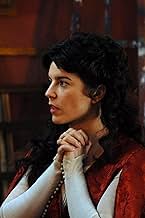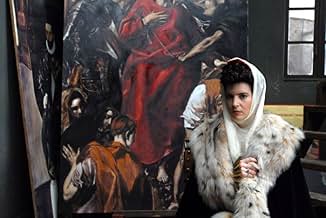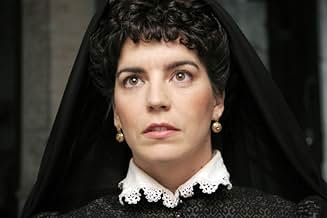El Greco
- 2007
- 1 घं 59 मि
अपनी भाषा में प्लॉट जोड़ेंThe story of the uncompromising artist and fighter for freedom, Domenicos Theotokopoulos, known to the world as "El Greco".The story of the uncompromising artist and fighter for freedom, Domenicos Theotokopoulos, known to the world as "El Greco".The story of the uncompromising artist and fighter for freedom, Domenicos Theotokopoulos, known to the world as "El Greco".
- निर्देशक
- लेखक
- स्टार
- पुरस्कार
- 12 जीत और कुल 2 नामांकन
- El Greco
- (as Nick Ashdon)
- Duke Da Rimi
- (as Yorgos Christodoulou)
- Don Miguel de las Cuevas
- (as Fermi Reixac)
- Manousos
- (as Theo Zoumpoulidis)
- Titian's Assistant
- (as Yorgos Karamichos)
- Auctioneer
- (as Renos Charalampidis)
- Greco's Father
- (as Yorgos Charalampidis)
- Older Inquisitor
- (as Ricard Borras)
फ़ीचर्ड समीक्षाएं
Widely promoted as "the most important Greek production ever" (of which there seems to be a new one every year), El Greco seems bound to achieve considerable commercial success in the Greek market. But it is the kind of movie most people will claim to like, and no one will bother to see twice. Which, after all, is the true indicator of a film's appeal. We weren't expecting loud explosions and car chases on a production about El Greco ; but a reasonable, intelligent plot and dialog that would not make you squirm in your seat in embarrassment would have been nice.
Not recommended. For those that missed it, worry not. You'll have another "greatest Greek production ever" foisted on you by the Greek television channel-sponsors to look forward to next year.
How small it seems now. You can see loftier production values on TV, and probably much better acting and a less grating parade of profundities.
What really offends though is the spirit behind the work. It's not that it is dull and completely without insight about its own craft. It is both these things, but that's a simple incompetence. I mean, here is a film about a man of extraordinary vision who wanted to paint with light, and the 'inspirational' film about him is wholly ordinary, as lush and spiritual as perfume. What poor use of Aris Stavrou, who once liked to puzzle (next to Nikos Nikolaidis) about texture and light.
It's that Smaragdis hoped to capture a bit of Greek soul (not necessarily historical 'truth') and journey with it abroad, a noble aim. Capture us as we dream ourselves to be, feisty and passionate Zorbas, made pensive by centuries of hardship - a bit like Kusturica did for the neighboring Yugoslavs.
The film is set in those centuries of foreign rule, Italian and Ottoman elsewhere. There was no Rennaisance allowed in those times, it would be good to note, no lofty national art as they could develop in the salons of Western Europe. Our painting was religious. Our theater was song and dance, from Thrace to Crete. The collective soul had to pour that way, which is why they still persist and resonate so strongly in these parts - as elsewhere in the former empire.
You will know it's all phony by watching the scene of proud Cretans dancing after a skirmish with the Italians. You'd think, if there was a bit of ancient Greek song rising from the earth, it would be in that scene. If you are ever in the region, go to a Cretan wedding or folk fest, in fact anywhere in rural Greece during times of celebration. Then watch the posturing in the film. Dismal.
If you want to know a bit about these things, to see actual Balkan spirit, seek out a man called Sergei Parajanov. He was Armenian who made films under Soviet rule, but it is the same soul he captured.
This is a costumer partially based on facts but predominates the slow-moving melodrama . Historic film about an uncompromising artist , El Greco/Nick Clark and his relationship to lovers and powerful people from Renaissance . The picture relies heavily on the loving relationships between El Greco and his women as Francesa/Dimitra Matsouka and Jerónima De Las Cuevas/Laia Marull as well as the patronage and subsequent confrontation to Niño De Guevara , the General Inquisitor/Juan Diego Botto , that was painted on a famous painting. This is a moving biography of the prestigious painter and fighter for freedom , including some fictitious elements . Glamorously as well as sumptuously photographed by Stavrou , and being lavishly produced by Greece and Spain . The motion picture was professionally directed Yannis Smaragdis and filmed with a pervasive melancholy that does for slow drama .
The picture based on actual events , these are the followings : In 1577, El Greco migrated to Madrid, then to Toledo, where he produced his mature Works . At the time, Toledo was the religious capital of Spain and a populous city . In Rome, El Greco had earned the respect of some intellectuals, but was also facing the hostility of certain art critics . During the 1570s the huge monastery-palace of El Escorial was still under construction and Philip II of Spain was experiencing difficulties in finding good artists for the many large paintings required to decorate it. El Greco met Benito Arias Montano, a Spanish humanist and agent of Philip; Pedro Chacón, a clergyman; and Luis de Castilla, son of Diego de Castilla, the dean of the Cathedral of Toledo. El Greco's friendship with Castilla would secure his first large commissions in Toledo. He arrived in Toledo by July 1577, and signed contracts for a group of paintings that was to adorn the church of Santo Domingo el Antiguo in Toledo and for the renowned El Espolio. By September 1579 he had completed nine paintings for Santo Domingo, including The Trinity and The Assumption of the Virgin. These works would establish the painter's reputation in Toledo. El Greco did not plan to settle permanently in Toledo, since his final aim was to win the favor of Philip and make his mark in his court. Indeed, he did manage to secure two important commissions from the monarch: Allegory of the Holy League and Martyrdom of St. Maurice. However, the king did not like these works and placed the St Maurice altarpiece in the chapter-house rather than the intended chapel. He gave no further commissions to El Greco. The exact reasons for the king's dissatisfaction remain unclear. Some scholars have suggested that Philip did not like the inclusion of living persons in a religious scene; some others that El Greco's works violated a basic rule of the Counter-Reformation, namely that in the image the content was paramount rather than the style. Philip took a close interest in his artistic commissions, and had very decided tastes; a long sought-after sculpted Crucifixion by Benvenuto Cellini also failed to please when it arrived, and was likewise exiled to a less prominent place. In any case, Philip's dissatisfaction ended any hopes of royal patronage El Greco may have had . Lacking the favor of the king, El Greco was obliged to remain in Toledo, where he had been received in 1577 as a great painter. While "Crete gave him life and the painter's craft, Toledo a better homeland, where through Death he began to achieve eternal life" . On 12 March 1586 he obtained the commission for The Burial of the Count of Orgaz, now his best-known work. During these years he received several major commissions, and his workshop created pictorial and sculptural ensembles for a variety of religious institutions, as the commission of The Virgin of the Immaculate Conception and for the Hospital of Saint John the Baptist , creating notorious paintings as The Disrobing of Christ , The Assumption of the Virgin , THe Holy Trinity , The Virgin of the Immaculate Conception .. In his mature works El Greco demonstrated a characteristic tendency to dramatize rather than to describe and the strong spiritual emotion transfers from painting directly to the audience . El Greco's preference for exceptionally tall and slender figures and elongated compositions, which served both his expressive purposes and aesthetic principles, led him to disregard the laws of nature and elongate his compositions to ever greater extents, particularly when they were destined for altarpieces .
For people waiting to explore the artist's character in-depth, understand his passions or his motivation, or admire a kaleidoscope that unlocks the artist's mind to the viewer, disappointment awaits in the corner, because this film does not explore those elements to a satisfactory level.
Nonetheless, the film does not really boast any of that, to start with. The story of it is staged early and very deliberately in the scheme of a broader conflict between light and darkness, and the portrayal of the artist is shown almost entirely through that prism. And it delivers this very well.
Right from the start, an intense scene puts us right in the proper atmosphere, and then the movie continues with a narrative that eventually carries us out seamlessly back into the initial scene, adding context, and appropriately coloring the characters in the meantime.
Costumes are fitting, although their quality ranges, and sometimes poor costume quality sneaks in. But not something that detracts from the bigger picture.
The music is great, of course, and adds a lot of value to the film.
The scenes are seamless and tie well with each other and the narrative that goes on in the background. The scenery is also attractive and adds a lot of character.
The actual script seems to have a lot of weak points (though that is not uncommon in Greek productions, and with this one it is still miles ahead of others).
The first serious issue of the script is the mix of languages. It probably started as a good idea, trying to portray linguistic differentiation, but soon enough, poor accents, weak dialogue (perhaps cut down even further so as not to linguistically challenge the actors) happens almost the entire time and detracts from the film.
The second issue is the dialogues themselves. The actors are great, and perfectly capable of portraying a lot more than the dialogues allow them to say. This is a shame.
The script's saving grace is the English narrative, which is respectable, and the ability of the actors (and the director, sometimes) who manage to convey with emotion what the script's words aren't adequate to show.
The film is otherwise well-laid out, despite some lighting issues (some scenes feel far too bright), and sound issues (audio ranges too wildly between near-whisper and wild shouting and banging).
I didn't have to try to overlook the shortcomings of this film in order to enjoy it. I certainly enjoyed watching it, and was glad I did, despite all the shortcomings.
Oscar nomination? Heh, perhaps not. But definitely a respectable, enjoyable film with some good moments, that is certainly worth watching.
It lacks of almost everything. No good dialogues, good actors wasted due to a, being good, a very poor script. It's a voice in off who tells you most part of the story... why do you want actors then I asked.
Probably the customs, colours and music is the only thing you can remember after watching it but not enough. I wanted to stop the movie several times cause is so superficial. You don't get involved at all with any of the characters, not with the story. Actually you don't care about El Greco after 20 min watching it.
I could feel the same frustration when I saw "El Capitán Alatriste". The Spanish movie with the highest budget ever in this country. Very, very disappointing. El Greco is, with all my respects, The Greek-Crap.
क्या आपको पता है
- ट्रिवियाThe last acting performance by Sotiris Moustakas.
- गूफ़Just after the battle, the wound on El Greco father's forehead changes places between shots, from left forehead to just over his eyebrow.
- भाव
El Greco: You once reached out for God, and your fingers closed on emptiness ; and you didn't learn. How can God speak to you when instead of loving you burn, ruin and spread hatred all around?
El Greco: Now, of course, my turn has come - but you can't burn me... and I'll tell you why :
El Greco: Because I've been burning all my life, my entire life ; not in the fire, in the light. I threw myself into the blaze of it.
El Greco: You light fires because you're afraid to burn. You are afraid of the light and this is why I pity you, my old friend, Niño de Guevara.
El Greco: Because you aren't wrong to be afraid, but every flame you light drives you deeper into the darkness and no matter how many people you burn, you will never escape it.
El Greco: Can the darkness condemn the light?
- साउंडट्रैकTa dakrya einai dyo logio
Performed by Loudovikos ton Anogeion
टॉप पसंद
- How long is El Greco?Alexa द्वारा संचालित
विवरण
- रिलीज़ की तारीख़
- कंट्री ऑफ़ ओरिजिन
- भाषाएं
- इस रूप में भी जाना जाता है
- El Greco - El último desafío a Dios
- फ़िल्माने की जगहें
- Rhodes, यूनान(Castle of the Grand Master)
- उत्पादन कंपनियां
- IMDbPro पर और कंपनी क्रेडिट देखें
बॉक्स ऑफ़िस
- दुनिया भर में सकल
- $96,20,040
- चलने की अवधि1 घंटा 59 मिनट
- रंग
- ध्वनि मिश्रण
- पक्ष अनुपात
- 1.78 : 1

